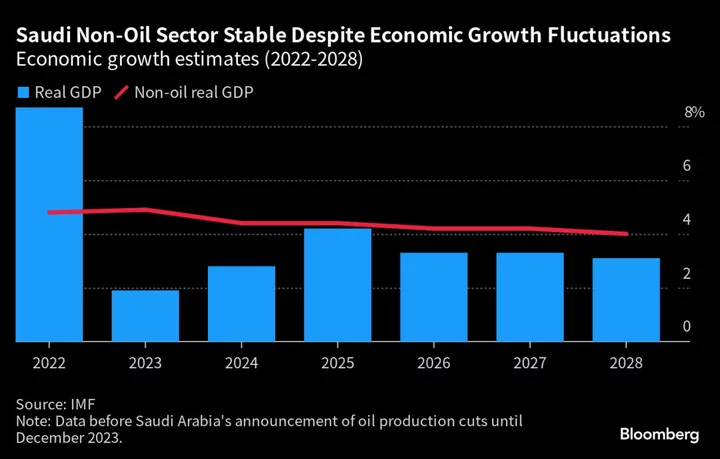US Treasury yields surged this week, sparking a broader selloff in global bond markets as investors brace for higher interest rates for longer.
Longer-dated US government yields reached levels last seen in the financial crisis, fueled in part by strong job-market data. That culminated with a report at the end of the week showing employment unexpectedly surged last month, bolstering the case for another Federal Reserve rate hike.
Governments took advantage of cheap borrowing costs during the pandemic to safeguard their economies. Now they have to refinance that at a much costlier price, sowing concerns about unsustainable fiscal deficits.
Here are some of the charts that appeared on Bloomberg this week on the latest developments in the global economy:
World
Not so long ago, families, businesses and governments were effectively living in a world of free money. As Treasury yields rise, that ripples out to broader markets, affecting everything from car loans to overdrafts to public borrowing and the cost of funding a corporate takeover.
For the past 18 months, Federal Reserve Chair Jerome Powell has frantically been trying to break Americans’ borrow-and-spend habits. It’s critical to his fight against inflation. In C-suites across the country, though, CEOs and CFOs aren’t getting the message.
Australia, New Zealand, India, Kenya, Romania, Uganda and Serbia left rates unchanged. Sri Lanka, Poland and Peru cut.
US
Nonfarm payrolls increased 336,000 last month — the most since the start of the year — after sizable upward revisions to the prior two months. The unemployment rate held at 3.8%, and wages rose at a modest pace.
When everyone expects a soft landing, brace for impact. That’s the lesson of recent economic history — and it’s an uncomfortable one for the US right now.
Europe
Quantitative easing, the policy tool deployed across the Group of Seven to stimulate economies through the financial crisis and pandemic, is rapidly falling out of favor in Britain. From politicians to economists and a former Bank of England governor, many are cooling rapidly on the merits of the tool as its cost to taxpayers and side effects become apparent.
Asia
China’s factories look to have stabilized for now, though the recovery has been far from swift and the momentum for growth may be in trouble without more policy support. An official gauge of manufacturing activity returned to expansion in September for the first time in six months, a sign that stimulus may be taking root. But a private gauge of activity in the sector underperformed.
Manufacturing activity remained muted in Asia ahead of the peak holiday season, extending its protracted slump this year. Factory activity in the region mostly worsened in September as lackluster global demand for goods drove a decrease in output and new work.
Emerging Markets
The World Bank lowered its economic growth forecast for South Asia for next year, although still expects it to be the fastest-growing emerging market region. South Asia’s economy will likely expand 5.6% in each of the next two years, down from an estimated 5.8% this year
Saudi Arabia has rewritten its budget forecast for next year, saying it expects a deficit instead of a surplus as it ramps up spending and tackles uncertainty in oil markets. The $1.1 trillion economy will narrowly avoid a contraction this year, according to Finance Ministry forecasts. By contrast, Bloomberg Economics expects the Saudi government’s oil supply cuts to shrink gross domestic product by about 0.7% this year.
Economics says it’s way past time for the International Monetary Fund to pull the plug on Argentina. Geopolitics helps explain why it hasn’t — yet. Over the past five years, the Fund has lent $43 billion in repeated bailouts for the Latin American nation — multiples more cash than anyone else has gotten — with dismal results.
--With assistance from Abeer Abu Omar, Thyagaraju Adinarayan, Christopher Anstey, Ruchi Bhatia, Patrick Gillespie, Claire Jiao, Eric Martin, Matthew Martin, Tom Orlik (Economist), Reade Pickert, Olivia Raimonde, Tom Rees, Anup Roy, Zoe Schneeweiss, Jack Sidders, Asantha Sirimanne, Manuela Tobias, Denise Wee and Anna Wong (Economist).

